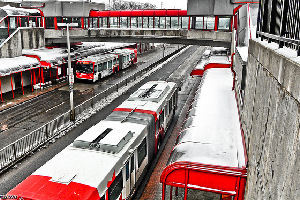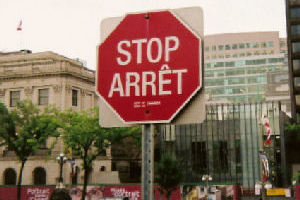Rationality, Pragmatism & Fiscal Responsibility
 A number of decisions, and indecisions, originating from Ottawa's City Council over the past four years have left me somewhat befuddled. First and foremost, I am a taxpayer and, as such, I expect the decisions made by my local government to be pragmatic, governed by rational thinking and fiscal responsibility. I believe that, by and large, the current Council have failed and fallen short in meeting my expectations as a taxpayer. It is precisely those shortcomings, or at least my perception of those shortcomings, which have served as the impetus in my decision to seek public office.
A number of decisions, and indecisions, originating from Ottawa's City Council over the past four years have left me somewhat befuddled. First and foremost, I am a taxpayer and, as such, I expect the decisions made by my local government to be pragmatic, governed by rational thinking and fiscal responsibility. I believe that, by and large, the current Council have failed and fallen short in meeting my expectations as a taxpayer. It is precisely those shortcomings, or at least my perception of those shortcomings, which have served as the impetus in my decision to seek public office.
I'd like to be represented on Council by an individual who is not only capable of making informed decisions, but committed to doing so in a financially prudent manner. I want a Councillor who is not only available, but capable of engaging constituents in a meaningful way and advocating on their behalf in a manner consistent with the three tenets mentioned above, the interests of the Ward and those of the City as whole. If you value those qualities and principles from your candidate in Alta Vista Ward, please consider voting for Jeff Dubois in the upcoming Ottawa municipal election scheduled for 27 October 2014. In an effort to provide voters with a clear understanding of my position on a few of the issues that have already been put towards me, a brief synopsis follows:

WASTE MANAGEMENT
Waste management seems to have become somewhat of a hot topic over the course of the past few weeks. Recently, in fact, CBC's All In A Day took to the streets and asked Alta Vista residents what issues were important to them in the upcoming election. John Arnold, an Alta Vista resident, opined that there was room for improvement in Ottawa's current recycling strategy and asked candidates to formulate responses based on his assessment of the current recycling program as part of Ottawa's overall waste management strategy.
Seven of the nine candidates provided responses and, as one might expect, the responses varied significantly. I believe a prudent approach would be to require the City's waste management experts to identify those areas (if any) where services might be improved on a cost-neutral basis. I would not support any new initiatives which would require funding through increased property taxes.

DEVELOPMENT
I would argue that, for the average resident, a person's home is quite likely their single biggest investment. We purchase our homes in particular communities for a number of reasons including cost, location, convenience and/or the local community. The character of our local communities is, in most instances, a reflection of the zoning bylaws within that community. Residents should expect certainty from these zoning provisions such that the character of their local community is preserved. Preserving the character of local communities is not the same as being anti-development. Development should be encouraged in those areas where zoning permits such development. Development, for development's sake however, is neither conducive, nor respectful of, prudent municipal planning.
The redevelopment of Lansdowne vis-a-vis a public-private arrangement was, in my view, an afront to the taxpayer. I believe it represents 40 years of taxpayer servitude to accommodate an unnecessary luxury. There's a reason why private interests would not embrace such a venture; it's because it's not lucrative. Lansdowne was, in my view, a very bad decision and the former Council's stance on development was, in part, the impetus for my candidacy.

INFRASTRUCTURE
Ottawa is like the World of Oz; the streets are paved with gold. Unfortunately, when city council embarks on frivolous spending sprees they're forced to do one of three things: raise taxes, borrow money or reallocate funds from other designated areas. Not surprisingly, when you start yanking the gold bricks out of Oz's roads, you get lots of potholes.
Many of Ottawa's roads are atrocious. It's almost ironic that the City can allocate funds for the hanging of Christmas wreaths along Alta Vista, but they seem unable, or unwilling, to repair Kilborn, a major thoroughfare which crosses Alta Vista. It doesn't really matter whether you drive, cycle, walk or take public transit; road transportation is an integral part of the city, and a bigger focus must be spent on an unfettered, efficient movement of goods, services and people through our communities.

RECREATION
I believe one of the best ways of enhancing our communities are through the provision of public recreational facilities. Our parks and recreational facilities serve to foster healthy lifestyles and family values. Some residents have asked me what my views would be on revitalizing some of the existing parks in the Alta Vista Ward. Over the course of the campaign period, I have visited a few of those facilities and find they are in need of renovation and revitalization. The revitalization of recreational facilities would be among my top priorities.
Free access to safe public spacess is an essential part of a vibrant community.

PUBLIC TRANSIT
I am an ardent supporter of Public Transit. For most transit users who travel outside of rush hour, transit optimization has become synonymous with a reduction of service. Optimization should be about increasing ridership with existing resources, not reducing expenditure and ridership simultaneously. As an example of poor optimization, one need only look at the 149 which runs through Alta Vista ward between Elmvale and Hurdman. The 149 used to service the Canterbury/Arch corridor, providing roughly 5 minutes or service to two churches, three schools, four low-rise buildings, a community centre, arena and park, and a small business centre which includes several businesses and a bank. As a result of optimization, the 149 now runs down Pleasant Park along a strip of road between Saunderson (Canterbury) and Arch where there are NO bus stops and a lack of sidewalks. In other words, the optimized route now serves no passengers. Moreover, there needs to be a more engaged process between OC Transpo planners and riders.

CYCLING INFRASTRUCTURE
A few residents have expressed a desire for massive infrastructure projects to enhance cycling throughout the city. Cyclists opine that special lanes and roads are required to facilitate their safe passage and that the lack of attention given this viable form of transportation is a reflection of cyclists not being treated as "real vehicles". I agree whole-heartedly: bicycles are not treated like real vehicles but we can easily remedy this by adopting a municipal vehicle registration system specifically for bicycles.
Such a system would provide several benefits including a new revenue stream to offset the costs of new infrastructure, an identification mechanism to discourage theft and increase recovery and an overall awareness of bicycles as real vehicles. The idea is, not surprisingly, embraced by all cyclists. One resident has cited a dated city report which suggested that a bicycle registration sytem would cost $100,000 but only generate $40,000 annually. Assuming registering a bicycle would cost roughly the same as a dog ($25 annually), $40,000 revenue would represent a modest 1600 cyclists in Ottawa. (It would be tough to argue huge infrastructure projects to accommodate 1600 cyclists.) Interestingly, the same resident relied upon a second study which suggested there were 400,000 cyclists in Ottawa. Again, assuming the $25 annual registration fee as required for dogs, 400,000 bicycles should generate about $10,000,000 annually which, I'd argue, should be sufficient to embark on an ambitious cycling infrastructure program.
I'm somewhat cynical about some of the data however as I was also provided with a statistic which suggested that 2.5% of all "trips" were conducted using bicycles. Rather than rely on self-reporting data, I opted to conduct my own ad hoc observational experiment. My methodology was simple: I went to the corner of Walkley & Conroy, right beside a bicycle path, and during rush hour I commenced counting vehicles. I counted 1000 vehicles and, to my surprise, not a single bicycle passed by. Now I'm not naive enough to suggest that bicycles aren't used in the city but I certainly didn't observe anywhere near the 2.5% figure (25 bicycles) that I should have seen had the statistic been accurate.
The bottom line on this one is that I would not commit any more resources into expanding bicycle infrastructure over and above the city's current commitments. I am open to further discussions with members of the cycling community to investigate other options on what new revenue source they can offer to attain their goals.

OFFICIAL BILINGUALISM
I have received about a half dozen emails on the topic of extending "official bilingualism" to the City of Ottawa. I found it interesting that an organization seeking official bilingualism would have forwarded me a unilingual French survey. Clearly, there's something to the officially bilingual concept that seems to have gone right over my head.
My position is simple and its based on pragmatism and fiscal restraint. I b elieve French language rights are already adequately protected in existing legislation and would not support any change in direction from the city's existing policies.
SUMMARY
I realize that a candidate cannot represent the interests of all voters. That said, the only interests I represent are those which side with pragmatism, rationality and fiscal responsibility. If you want the municipality to fill the vacant "Poet Laureat" position, vote for a candidate committed to doing so. In my view, such extravagances should be eliminated entirely and not debated. Having said all that what's more important than whether I get your vote is whether or not you vote at all. Please vote... the outcome is by your design, not mine.
Submitted by Jeff Dubois, 30 September 2014